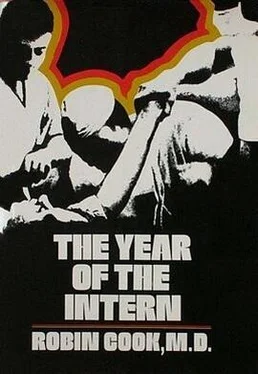It was now eight in the morning and here I was, after a sleepless night, with a full schedule of surgery ahead of me, still standing and holding that foot like so much dead weight. A job for a bunch of sandbags. In fact, sandbags would have done a better job; they do not sag or get angry. This was not the first time I had fallen asleep in the OR. Helping once on a thyroid case after a night without sleep, I had drifted away while holding the retractors. For only an instant, I think, because I had suddenly given one of those falling-asleep jerks, which startled the surgeon. He had asked, only partly in jest, if I was about to have an epileptic fit. But I don’t think that surgeon knew I had fallen asleep. This one did, and he was irritated, although he and his sidekick continued to ignore me. Finally, when everything was finished and I was preparing to leave, the surgeon let me have it. “Well, Peters, if falling asleep during a case indicates your interest in surgery, I think the fact should be brought to the attention of the board.” Rather than tell him to go to hell, I backed all the way down and pleaded lack of sleep and not being able to see the operative field. He was not impressed. “I’d advise you not to let it happen again.” “No, sir.” I walked out, harboring ineffectual, murderous thoughts.
The regular surgical schedule had begun more than an hour before. In fact, I had missed my first case, which didn’t upset me much. It was a second assistant’s spot on a cholecystectomy, totally routine. Besides, I was scheduled for two more of them that afternoon. Sneaking down to the surgeons’ lounge, I scrounged a few slices of bread, my first food in about fifteen hours. As for sleep, I wasn’t much better off — one hour during the last twenty-six. I felt a little weak. The thought of another full day in surgery was not cheering.
In the lounge I was bearded by an irritated chief resident who demanded to know where I had been during rounds. Early on, an intern learns the impossibility of pleasing everybody. Lately, however, I was striking out every time up and pleasing nobody, least of all myself. I reported to the chief resident on the few staff patients I had. Since I was on the private teaching service, I didn’t have many staff patients — only those whose surgery I’d helped with. Both hernias were doing fine; the gastrectomy was already eating; the veins were okay and walking; and neither hemorrhoid had managed a BM. The disease paraded verbally out of me, unattached to personal names or thoughts.
I almost forgot to mention the aneurysm patient whom we had scheduled for aortography that day. He had been sent to us from one of the outer islands because his X ray showed a suspicious shadow in the left lung field. It was probably an aneurysm, a bulge in his major artery. Without surgery, such an aneurysm generally bursts in six months or so, and the patient quickly bleeds to death. So it was important to act quickly, and to be sure of the diagnosis, which we could do best by making an aortogram. This fairly simple procedure took place in X-ray, where radiopaque dye would be injected into the man’s artery just above the heart. For a few moments, before the blood swept it away, the dye would outline the shape of the artery, and X rays taken in rapid sequence would pick up an imperfection. Only then would we know whether surgery was necessary. Since I had done the history and physical on the man, I wanted to be there, and I asked the chief resident about it. “Sure,” he said. “If the surgical schedule permits.”
That part of the system had not changed during the past nine months. We interns were still bounced back and forth between cases at the whim of the surgical schedule; too often, we had to miss seeing our own patients. If you work a patient up, you should stay with him and follow him through all his diagnostic procedures and his surgery. No one would care to argue against that, either from an academic point of view or from the standpoint of the patient’s good. Nevertheless, whenever someone needed an extra pair of hands on a gall-bladder attempt (our minds, it seemed, were never in demand), we were sacrificed, without regard to the educational aspect or to the psychological effect on our own patients. It was another way to impress upon us how very dispensable we were.
The chief resident disappeared, and a few minutes later I got a call from the surgical desk telling me that he had assigned me to help on a gastrectomy that was already under way. Apparently those extra hands were needed. I finished my stale bread and plodded once more into the OR area, mentally mapping out the rest of my day in surgery. After the present gastrectomy, I was scheduled for a nephrectomy — a kidney removal — in Room 10, and then the two cholecystectomies. As I passed Room 10 I realized the nephrectomy was already under way and that I would miss it. Nakano, another intern, was scrubbing on the case. Lucky bastard. That nephrectomy was more interesting to me than all the other cases put together. The patient had a tumor on his kidney, and the tumor had to be removed, even though it was not malignant. Until very recently, the surgeon on such a case would have been forced to take out the whole kidney; now, with advanced radiology, such tumors could be “mapped” very accurately, so that only the involved portion need be cut away. Ah, well, another time. I continued down the corridor toward my gastrectomy assignment. Normally I would also have been dismayed at the prospect of back-to-back cholecystectomies. But today I was in for a bit of luck, because both were scheduled with a good teaching surgeon. This man was like an oasis in a desert of conservatism. Of course, there was always a chance that the gastrectomy I was joining now would run over into the first cholecystectomy with the teaching surgeon. I hoped not.
Hardly noticing the activity around me, I strolled slowly down toward Room 4, in no hurry, forcing myself all the way. A glance at the operating schedule posted on the bulletin board increased my dismay. Like the Supercharger, this G.P. was a man of advanced age, small skill, and no modesty. He was also given to interminable and egotistical stories about his travail in the early days. Apparently, he had for years carried most of the burden of American medical service on his shoulders, performing feats of skill and endurance that blew the mind. At least, they blew his mind. A puckish resident had once dubbed him Hercules, and the name stuck. Hercules was another who always admitted his patients on the teaching service, so that the house staff would do histories and physicals for him. If you ever ordered an X ray, or even an extra blood count, he’d hit the ceiling, bawling you out for extravagant utilization of costly laboratory tests. Apparently 99 per cent of the lab tests had been developed since he graduated from medical school about the time the Curies were beginning to play around with pitchblende. Moreover, he had a favorite habit of prescribing penicillin or tetracycline for every cold that appeared in the ER — a practice that virtually all medical authorities now agree is worse than doing nothing at all. That he was supposed to be one of our teachers was simply a bad joke.
I had scrubbed with Hercules several months earlier, on a kidney-stone removal. At the time, he’d just finished reading, so he said, an article in a recent surgical journal recommending a new way to remove kidney stones. I doubted that Hercules read deeply or often, but this article had intrigued him — although he could not seem to remember the name of either the author or the journal, or even where the experiment had been conducted. As he worked down to the kidney, fondling the notion of this new procedure, he had indulged his habit of slicing through arteries indiscriminately and then stepping back to say, “Get that bleeder, boy,” hardly interrupting what he was talking about. The resident would scramble around in the wound, dabbing with gauze sponge and hemostats, while the surgeon pontificated.
Читать дальше












